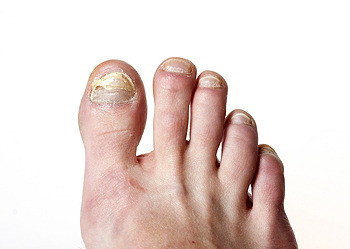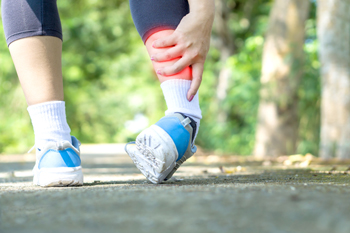
 Fungi are microorganisms that get their nutrients from a host. There are various kinds of fungi—some of which can cause infections (mycosis). Fungal infections can be spread either through person-to-person contact or exposure to contaminated surfaces. Onychomycosis is a fungus that affects the nails and nail beds—most commonly on the toes. If you have toenail fungus you may notice discoloration or scaling that appears under the nail, your nail may flake or crumble, or even separate from the nail bed. Over time, the nail can thicken and become brittle. If you do have a fungal infection, it may take months, even years to go away—if it all. A podiatrist can test your nail to make a proper diagnosis and treat toenail fungus properly through a variety of treatments including prescription medications, nail debridement, or laser therapy.
Fungi are microorganisms that get their nutrients from a host. There are various kinds of fungi—some of which can cause infections (mycosis). Fungal infections can be spread either through person-to-person contact or exposure to contaminated surfaces. Onychomycosis is a fungus that affects the nails and nail beds—most commonly on the toes. If you have toenail fungus you may notice discoloration or scaling that appears under the nail, your nail may flake or crumble, or even separate from the nail bed. Over time, the nail can thicken and become brittle. If you do have a fungal infection, it may take months, even years to go away—if it all. A podiatrist can test your nail to make a proper diagnosis and treat toenail fungus properly through a variety of treatments including prescription medications, nail debridement, or laser therapy.
For more information about treatment, contact Dr. Edward D. Hutson of Easton, PA. . Our doctor can provide the care you need to keep you pain-free and on your feet.
Toenail Fungus Treatment
Toenail fungus is a condition that affects many people and can be especially hard to get rid of. Fortunately, there are several methods to go about treating and avoiding it.
Antifungals & Deterrence
Oral antifungal medicine has been shown to be effective in many cases. It is important to consult with a podiatrist to determine the proper regiment for you, or potentially explore other options.
Applying foot powder on the feet and shoes helps keep the feet free of moisture and sweat.
Sandals or open toed shoes – Wearing these will allow air movement and help keep feet dry. They also expose your feet to light, which fungus cannot tolerate. Socks with moisture wicking material also help as well.
If you have any questions please feel free to contact our offices located in Easton, and Northampton, PA . We offer the newest diagnostic tools and technology to treat your foot and ankle needs.
 Plantar fasciitis is a common foot problem in which the ligament that runs along the bottom of the foot is injured and becomes inflamed, leading to foot pain. More specifically, plantar fasciitis tends to cause pain in the heel and arch of the foot. In its initial stages, this condition can make you feel an uncomfortable sensation under your heel, as if you have a lump there. The heel may feel tender when you take your first steps after a long period of rest, but pain usually subsides as you get moving about your day. Over time, however, the pain and tenderness may stay with you longer. You might feel stabbing or needle-like pain in your heels. In the most advanced stages of plantar fasciitis, the pain becomes constant and interferes with your daily activities. If you suspect you may have plantar fasciitis, please seek the care of a podiatrist.
Plantar fasciitis is a common foot problem in which the ligament that runs along the bottom of the foot is injured and becomes inflamed, leading to foot pain. More specifically, plantar fasciitis tends to cause pain in the heel and arch of the foot. In its initial stages, this condition can make you feel an uncomfortable sensation under your heel, as if you have a lump there. The heel may feel tender when you take your first steps after a long period of rest, but pain usually subsides as you get moving about your day. Over time, however, the pain and tenderness may stay with you longer. You might feel stabbing or needle-like pain in your heels. In the most advanced stages of plantar fasciitis, the pain becomes constant and interferes with your daily activities. If you suspect you may have plantar fasciitis, please seek the care of a podiatrist.
Plantar fasciitis can be very painful and inconvenient. If you are experiencing heel pain or symptoms of plantar fasciitis, contact Dr. Edward D. Hutson from Easton, PA. . Our doctor can provide the care you need to keep you pain-free and on your feet.
What Is Plantar Fasciitis?
Plantar fasciitis is the inflammation of the thick band of tissue that runs along the bottom of your foot, known as the plantar fascia, and causes mild to severe heel pain.
What Causes Plantar Fasciitis?
How Can It Be Treated?
While very treatable, plantar fasciitis is definitely not something that should be ignored. Especially in severe cases, speaking to your doctor right away is highly recommended to avoid complications and severe heel pain. Your podiatrist can work with you to provide the appropriate treatment options tailored to your condition.
If you have any questions please feel free to contact our offices located in Easton, and Northampton, PA . We offer the newest diagnostic and treatment technologies for all your foot and ankle needs.
After a long winter, the sun is shining, the weather is warm, and you can finally wear your favorite flip-flops every day. Or, maybe not. Flip-flops, while relatively comfortable and easy to slip on, are not good for your feet. When you wear flip-flops, you may notice that you have to clench your toes around the edge of the shoe to keep it in place as you walk. This action is bad for the muscles in your feet and calves. The constant tension in your toes needed to keep that flip-flop on your foot can change your pattern of walking, make the toes stiff, and lead to foot and ankle injuries. Frequent flip-flop wearers may be more at risk of plantar fasciitis, a condition that causes stabbing heel pain and makes walking uncomfortable. Instead of flip-flops, try sandals that have a back and straps to keep your foot in place. If you have any foot or ankle pain, please consult with a podiatrist.
Flip-flops are not always the best choice of footwear. If you have any concerns about your feet or ankles, contact Dr. Edward D. Hutson from Easton, PA. . Our doctor will assist you with all of your foot and ankle needs.
Flip-Flops and Feet
When the weather starts warming up, people enjoy wearing flip-flops. Flip-flops are comfortable, stylish, and easy to slip on and off; they're perfect for any summer beach goer. However, these shoes can cause harm to the feet.
How Can Flip-Flops Affect Me Long-Term?
Are There Injuries Associated with Flip-Flops?
Yes. Since flip-flops are relatively weak and do not provide the same amount of support as sneakers, people who wear flip-flops regularly are more susceptible to injuries. On top of that, the open nature of the shoe makes your feet more prone to other problems, such as cuts and even infections. Common injuries and ailments include:
I like Wearing Flip-Flops. Are There Safe Alternatives?
When buying flip-flops, try to find ones that have sturdy soles and that are made of high-quality materials that will support for your feet. These flip-flops will cost more but will also last longer as a result.
If you have any questions please feel free to contact our offices located in Easton, and Northampton, PA . We offer the newest diagnostic and treatment technologies for all your foot and ankle needs.
 Foot and ankle injuries are common occurrences among runners. Overload or overuse is one of the most frequent reasons for injury. When running, increasing the intensity, distance, or duration of your workouts too quickly can place your feet and ankles under immense stress and make them more susceptible to conditions like plantar fasciitis and stress fractures. A lack of strength and flexibility in your lower limbs may also make injuries more likely, so it is important to stretch and strengthen the feet and ankles. There are other potential causes for injury, such as muscle imbalances or not taking enough time to recover following a workout. For more information about running injuries and how to prevent them, please consult with a podiatrist.
Foot and ankle injuries are common occurrences among runners. Overload or overuse is one of the most frequent reasons for injury. When running, increasing the intensity, distance, or duration of your workouts too quickly can place your feet and ankles under immense stress and make them more susceptible to conditions like plantar fasciitis and stress fractures. A lack of strength and flexibility in your lower limbs may also make injuries more likely, so it is important to stretch and strengthen the feet and ankles. There are other potential causes for injury, such as muscle imbalances or not taking enough time to recover following a workout. For more information about running injuries and how to prevent them, please consult with a podiatrist.
Exercising your feet regularly with the proper foot wear is a great way to prevent injuries. If you have any concerns about your feet, contact Dr. Edward D. Hutson of Easton, PA. . Our doctor will treat your foot and ankle needs.
How to Prevent Running Injuries
Many common running injuries are caused by overuse and overtraining. When the back of the kneecap starts wearing out and starts causing pain in your knee, this is commonly referred to as runner’s knee. Runner’s knee is a decrease in strength in your quadriceps and can occur if you’re not wearing properly fitted or supporting shoes. To prevent runner’s knee, focusing on hip strengthening is a good idea, as well as strengthening your quads to keep the kneecaps aligned.
What Are Some Causes of Running Injuries?
- One cause of a common running injury is called iliotibial band syndrome.
- Plantar fasciitis is also another common injury.
- Stress fractures can occur from overtraining, lack of calcium, or even your running style.
Best Ways to Prevent Running Injuries
- Wear footwear that fits properly and suits your running needs.
- Running shoes are the only protective gear that runners have to safeguard them from injury.
- Make a training schedule. Adding strengthening exercises as well as regular stretching can help keep you strong and limber and can lessen the possibility of injuries.
- Stretching keeps muscles limber; this will help you gain better flexibility.
If you have any questions please feel free to contact our offices located in Easton, and Northampton, PA . We offer the newest diagnostic and treatment technologies for all your foot and ankle needs.